特长生培养记录
- 格式:docx
- 大小:116.29 KB
- 文档页数:4
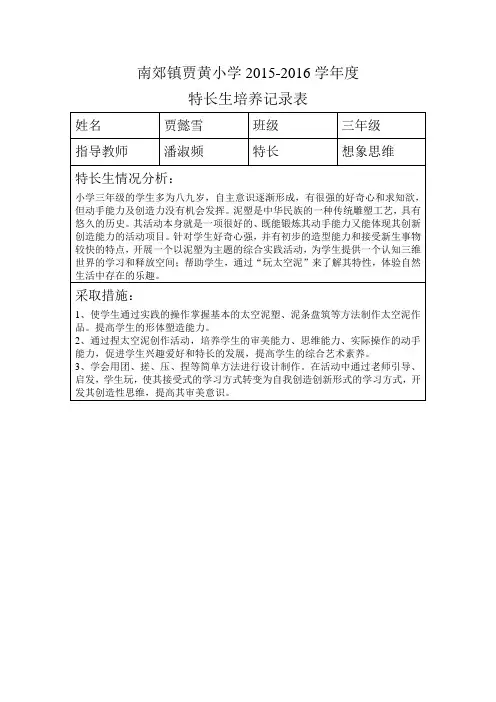
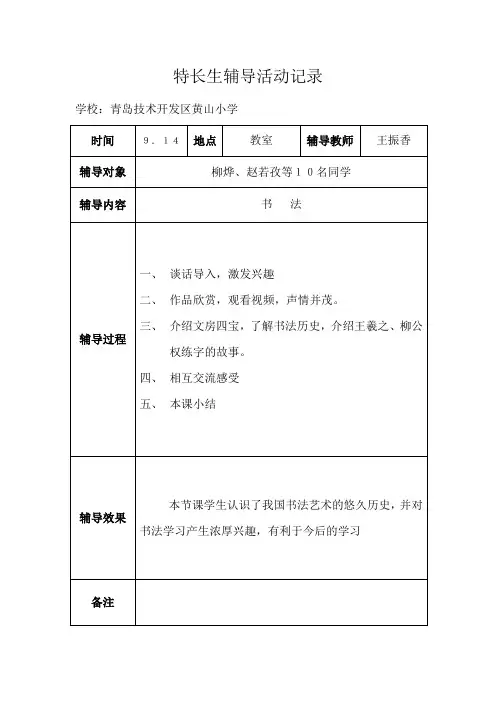
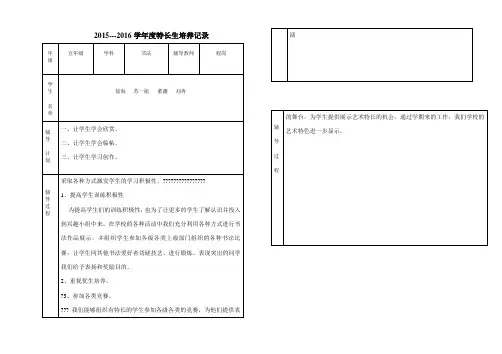
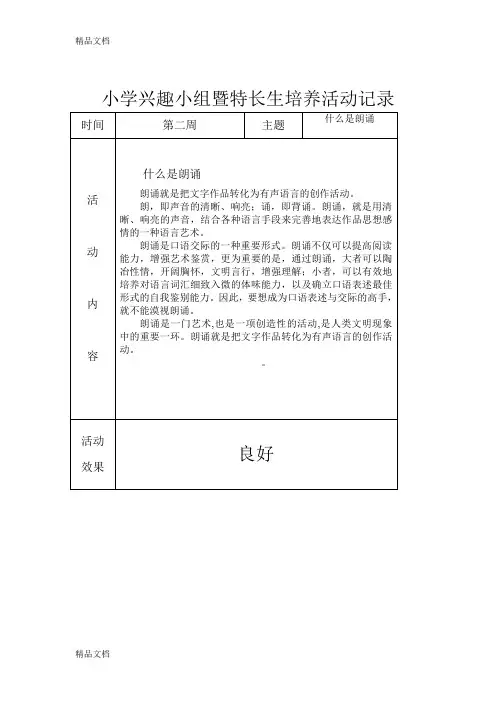
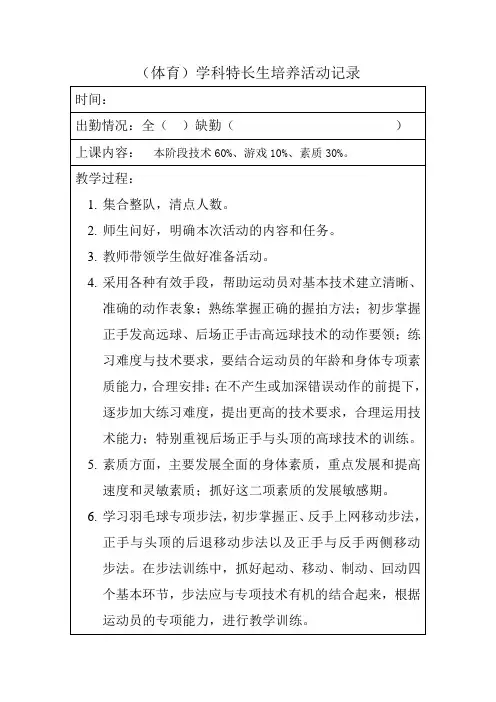
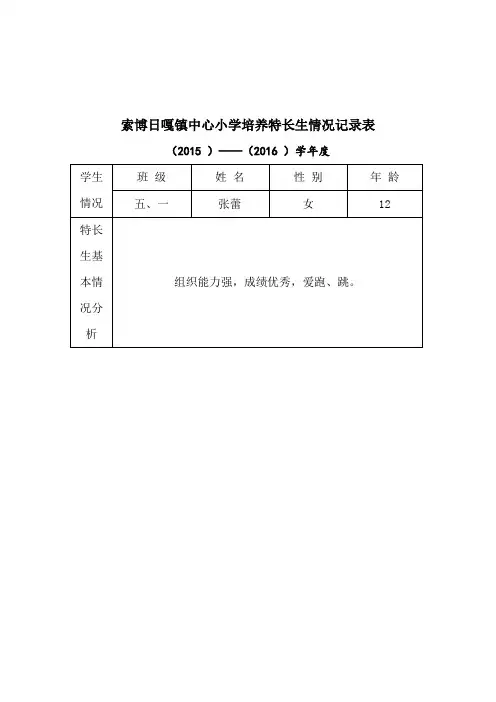
索博日嘎镇中心小学培养特长生情况记录表(2015 )——(2016 )学年度学生情况班级姓名性别年龄五、一张蕾女12特长生基本情况分析组织能力强,成绩优秀,爱跑、跳。
培养过程及所采取的措施分组对抗刺激法。
体育特长生中大部分都具有不服输的精神,他们都有着倔强的韧劲,因此分组对抗练习对他们来说是一种非常好的练习方法,因为这种训练方法很是迎合这一年龄段孩子的心理,这种训练方法不但可以较快地提高体育特长生的运动成绩,(2015 )——(2016 )学年度学生情况班级姓名性别年龄五、二李艳婷女12特长生基本情况分析具有较突出的运动能力。
培养过程及所采取的措施开小灶法在平时训练中,我们根据一些学生的身体状况和运动潜质,适当增加一些专门的训练科目,以提高他的运动技能技术平,也称之为“开小灶”。
这其中,额外加量训练法便是我们最熟悉和最常用的训练方法。
(2015 )——(2016 )学年度学生情况班级姓名性别年龄五、二朱文静女12特长生基本情况分析具备一定的身体素质,身材较好。
培养过程及所采取的措施培养小学体育特长生的意识有利与学生积极的训练,在体育课余训练中,我深刻的体会到学生在领悟体育意识和练习技能动作过程中,一旦形成自觉、主动稳定性,他们的训练成绩就会表现出突出性、实效性、创造性。
索博日嘎镇中心小学培养特长生情况记录表( 2015 )——(2016 )学年度学生情况班级姓名性别年龄五、二石涵女12特长生基本情况分析善于思考,有运动天赋。
培养过程及所采取的措施培养小学体育特长生的观念也特别特别重要。
根据小学生的身心特点和心理特征发现,要充分发展学生个性,就要通过各种体育比赛,使他们在学校占有一席之地。
能够体会成功的喜悦,并激发多次追求成功的欲望。
加深对体育的情感,逐渐促进体育情感的产生和发展,从而发挥体育观念的导向作用,让学生能够自觉主动地学习。
( 2015 )——(2016 )学年度学生情况班级姓名性别年龄五、二邵雨欣男12特长生基本情况分析老实稳重,勤奋好学,有恒心,有毅力,成绩优秀。
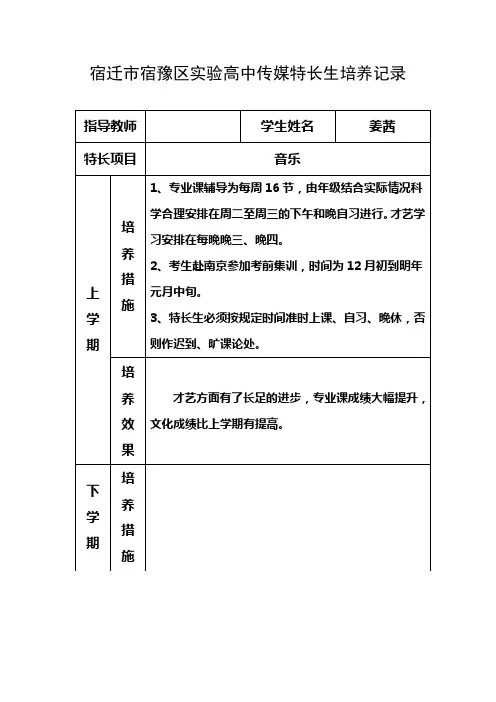
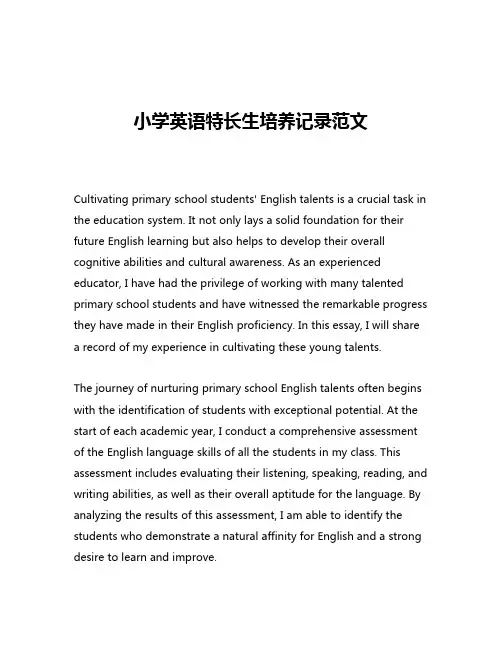
小学英语特长生培养记录范文Cultivating primary school students' English talents is a crucial task in the education system. It not only lays a solid foundation for their future English learning but also helps to develop their overall cognitive abilities and cultural awareness. As an experienced educator, I have had the privilege of working with many talented primary school students and have witnessed the remarkable progress they have made in their English proficiency. In this essay, I will share a record of my experience in cultivating these young talents.The journey of nurturing primary school English talents often begins with the identification of students with exceptional potential. At the start of each academic year, I conduct a comprehensive assessment of the English language skills of all the students in my class. This assessment includes evaluating their listening, speaking, reading, and writing abilities, as well as their overall aptitude for the language. By analyzing the results of this assessment, I am able to identify the students who demonstrate a natural affinity for English and a strong desire to learn and improve.Once the talented students are identified, the next step is to design a personalized learning plan for each of them. This plan takes into account their individual strengths, weaknesses, and learning styles, and is tailored to help them reach their full potential. For instance, some students may excel in oral communication but struggle with written expression, while others may have a strong grasp of grammar but need to work on expanding their vocabulary. By addressing these specific areas of development, I am able to help the students overcome their challenges and achieve remarkable progress.One of the key components of my approach to cultivating primary school English talents is the incorporation of a wide range of teaching methods and resources. I firmly believe that a one-size-fits-all approach to education is not effective, especially when it comes to language learning. Therefore, I make use of a variety of instructional strategies, including interactive games, multimedia presentations, group discussions, and individual projects, to cater to the diverse learning needs of my students.Moreover, I place a strong emphasis on fostering a supportive and engaging learning environment. I understand that learning a new language can be a daunting and intimidating experience for many students, especially at the primary school level. To address this, I strive to create a classroom atmosphere that is warm, encouraging, and conducive to risk-taking. I praise and celebrate the students'successes, no matter how small, and provide constructive feedback to help them overcome their challenges.One of the most rewarding aspects of my work in cultivating primary school English talents is witnessing the remarkable progress that the students make over time. I have seen shy and hesitant students blossom into confident and articulate communicators, and I have watched as students who once struggled with basic vocabulary and grammar concepts develop a deep understanding and mastery of the language.For instance, one of my students, Sarah, came to me in the beginning of the year with a limited English vocabulary and a strong aversion to speaking in front of her peers. Through a combination of targeted instruction, individualized practice, and a supportive learning environment, Sarah gradually overcame her fears and began to engage more actively in class discussions. By the end of the year, she was not only speaking English fluently but also demonstrating a strong grasp of complex grammatical structures and a rich vocabulary.Another student, Liam, had a natural talent for English but struggled with writing. He would often become frustrated and discouraged when faced with writing assignments. To help him, I incorporated more creative writing exercises into our lessons, encouraging him toexpress his thoughts and ideas through storytelling and poetry. Over time, Liam's writing skills improved dramatically, and he even began to win awards in local writing competitions.These are just a few examples of the many success stories that I have witnessed in my work with primary school English talents. Each student's journey is unique, and the challenges they face may vary, but the common thread is the dedication, perseverance, and passion that they bring to their learning.As an educator, I am deeply committed to the continued development and support of primary school English talents. I believe that by investing in the education and nurturing of these young minds, we can not only help them to achieve academic success but also cultivate a new generation of global citizens who are equipped with the language skills and cultural awareness necessary to thrive in an increasingly interconnected world.In conclusion, the cultivation of primary school English talents is a crucial and rewarding endeavor. Through personalized learning plans, a diverse range of teaching methods, and a supportive and engaging learning environment, I have witnessed the remarkable progress and achievements of my students. As I continue to work with these talented individuals, I am inspired by their passion, determination, and the endless possibilities that lie ahead of them.。
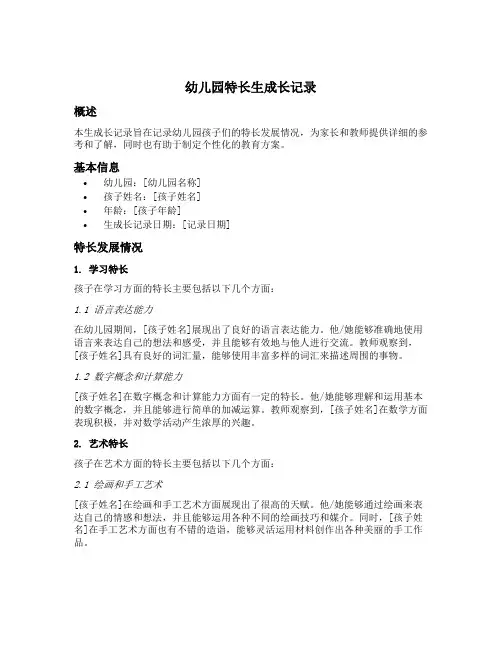
幼儿园特长生成长记录概述本生成长记录旨在记录幼儿园孩子们的特长发展情况,为家长和教师提供详细的参考和了解,同时也有助于制定个性化的教育方案。
基本信息•幼儿园:[幼儿园名称]•孩子姓名:[孩子姓名]•年龄:[孩子年龄]•生成长记录日期:[记录日期]特长发展情况1. 学习特长孩子在学习方面的特长主要包括以下几个方面:1.1 语言表达能力在幼儿园期间,[孩子姓名]展现出了良好的语言表达能力。
他/她能够准确地使用语言来表达自己的想法和感受,并且能够有效地与他人进行交流。
教师观察到,[孩子姓名]具有良好的词汇量,能够使用丰富多样的词汇来描述周围的事物。
1.2 数字概念和计算能力[孩子姓名]在数字概念和计算能力方面有一定的特长。
他/她能够理解和运用基本的数字概念,并且能够进行简单的加减运算。
教师观察到,[孩子姓名]在数学方面表现积极,并对数学活动产生浓厚的兴趣。
2. 艺术特长孩子在艺术方面的特长主要包括以下几个方面:2.1 绘画和手工艺术[孩子姓名]在绘画和手工艺术方面展现出了很高的天赋。
他/她能够通过绘画来表达自己的情感和想法,并且能够运用各种不同的绘画技巧和媒介。
同时,[孩子姓名]在手工艺术方面也有不错的造诣,能够灵活运用材料创作出各种美丽的手工作品。
2.2 音乐表演[孩子姓名]在音乐表演方面表现出了一定的特长。
他/她能够准确地演唱和模仿各种不同的音乐曲调,并且能够通过乐器演奏来表达自己的情感。
教师观察到,[孩子姓名]在音乐方面拥有很好的节奏感和音准感。
3. 运动特长孩子在运动方面的特长主要包括以下几个方面:3.1 球类运动[孩子姓名]在球类运动方面具有较强的天赋。
他/她能够准确地控制球的运动轨迹,并且能够熟练地执行各种不同的球类动作和技巧。
教师观察到,[孩子姓名]在球类运动中表现出了很好的协调性和反应速度。
3.2 动感游戏[孩子姓名]在动感游戏方面显示出了一些特长。
他/她能够积极参与各种运动游戏,并且能够配合团队完成不同的动作和任务。
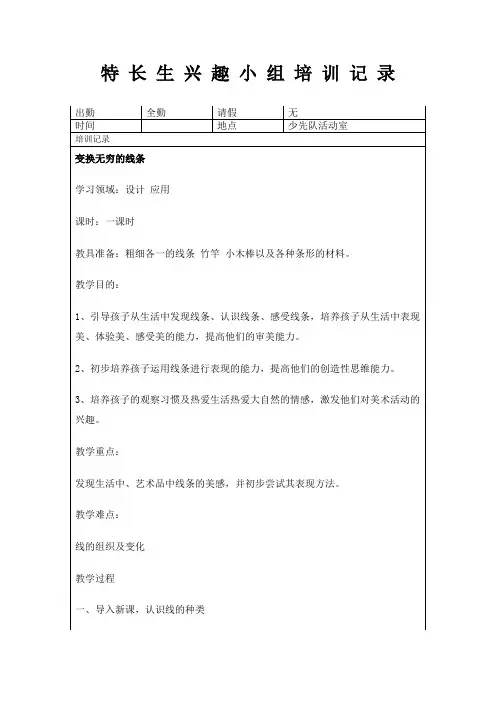
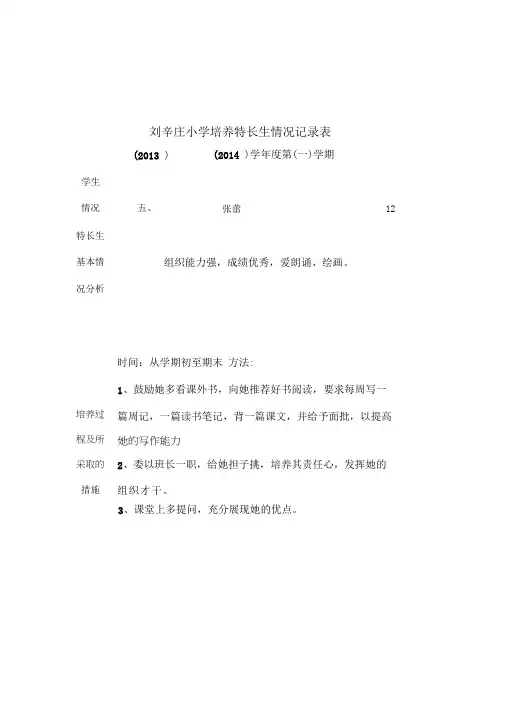
培养过 程及所 她的写作能力
采取的 刘辛庄小学培养特长生情况记录表
时间:从学期初至期末 方法:
1、鼓励她多看课外书,向她推荐好书阅读,要求每周写一
篇周记,一篇读书笔记,背一篇课文,并给予面批,以提高
2、委以班长一职,给她担子挑,培养其责任心,发挥她的
3、课堂上多提问,充分展现她的优点。
学生 情况 特长生 基本情 况分析
(2013 ) 五、
(2014 )学年度第(一)学期
张蕾 12
组织能力强,成绩优秀,爱朗诵、绘画。
措施
组织才干。
刘辛庄小学培养特长生情况记录表(2013 ) ―― ( 2014 )学年度第(一)学期
刘辛庄小学培养特长生情况记录表(2013 ) ―― ( 2014 )学年度第(一)学期
(20132014 )学年度第(一)学期刘辛庄小学培养特长生情况记录表
刘辛庄小学培养特长生情况记录表(2013 ) ―― ( 2014 )学年度第(一)学期
刘辛庄小学培养特长生情况记录表(2013 ) ―― ( 2014 )学年度第(一)学期。
谈谈音乐特长生的培养:音乐特长生培养记录表音乐教学在广大的农村学校的贯彻落实,农村的音乐教师们都很清楚,基本上不能照常教学。
即使有个别的中小学学校开设了此学科,但也是由非专业的音乐老师任教,没有考试任务就教一教,有考试任务就让一让。
教学效果可想而知,学生自然是学知甚少。
那么中学特长生的培养难度也就不言而喻。
仅就学校音乐特长生的训练,谈谈自己的几点体会。
1明确特长生训练的目的教师首先要拟定一份针对农村中学特长生训练的总计划,计划里要有运用什么样的手段和方法,清晰的目标、目的。
有了计划作为指导,才会少走弯路,整体的效果才会更好。
如果无计划,只是盲目地训练,不但耽误时间,而且还会使学生感到无意义,时间长了就会失去学习兴趣。
由于特长班的人数不少,训练时间不长,特长生训练就受到了限制,指导教师在训练之前,既要有清醒的头脑,明确的目标,还要提前备课,对训练内容仔细分析,仔细推敲,对每一节课的作品都应该了解基本情况及作品中的难点,选择合适的方法训练,只有通过这一系列训练前的充分准备,音乐特长生在训练中才可避免不必要的错误出现,指导教师对上课内容也就胸有成竹,可在有限的时间里,进行有效果的训练。
2先“相才”再“施教”了解学生即“相才”是关键。
在开始系统训练之前,教师除了在训练前有充分的准备外,教师还要对学生必须有全面的了解。
而要了解一个学生,决不是一蹴而就的,需要一个过程。
在前几次的训练中,教师可以让学生对已经学过的一两首作品进行简单的表演,通过学生的表现,教师可以看出学生的基本条件,要快速的决定学生的去留问题。
有的学生提出:”老师我能学唱歌吗?我适合学唱歌吗“?教师要给予肯定,鼓励他们参加特长班的训练。
对条件实在不好的学生教师也要用委婉的方式进行交谈,以免伤害他们的自尊心。
千万不可对学生忽悠,不负责任,让他们明白除了学习音乐之外,还有更适合他们的专业,否则会耽误他们的前程。
很多条件不是很好的同学都很高兴的离开了特长班的训练,并没有苦恼、带着情绪的离开特长生训练班。
一年级特长生辅导记录(1)年级一学科语文辅导教师姓名李丽姓名李铁松日期4月12日辅导主题培养学生的学习兴趣,养成好的学习习惯。
辅导内容记录把句子补充完整。
hui 1、我会_________________________________。
xi huan 2、___________喜欢______________________。
qi 3、___________和___________一起______________________。
九、按课文内容填空: 1、嫦娥姐姐了,高兴地:“ 弟弟,回 候定要把带,真想回家看看。
”2、蓝天家,树小鸟 家,小河家。
3、闹了,笑了,深夜, 睡觉了。
着明,着星星。
4、怀素非常认真。
总看清 形状,记笔顺,再笔 画照着效做得较好果一年级特长生辅导记录(2)年级一学科语文辅导教师姓名李丽姓名李雪茹日期4月22日辅导主题培养学生的学习兴趣,养成好的学习习惯。
辅导内容记录1、比一比,看谁说得多(黑黑的 ,像 。
绿绿的 ,像 。
花花的 ,像 ,小小的 ,像 。
2、上学来,你想带什么?(在要带物品拼音下划横线。
)shū bao qiān bǐ yǔ wén shū xiǎo gǒu zhǐ jīn xiāo bǐ qìyī fu dà dāo zuò yè běn wén jù hé huàr shū wán jù效果做得较好一年级特长生辅导记录(3)年级一学科数学辅导教师姓名李丽姓名李香凝日期5月28日辅导主题培养学生的学习兴趣,养成好的学习习惯。
辅导内容记录1、培养对数学学习的兴趣。
2、学生在课上对待学习不认真,容易溜号,帮忙改掉这个坏习惯。
3、有针对性对其指导训练,注重学生的情绪让她逐渐改变观点。
4、要对其进行一定有目的的考试,增强信心。
5、学生在学习的过程中注重了学习的内涵,加深了思维认识,对高难度的问题的解决已有一定的知识基础和技能。
六年级计算机特长生培养记录
计算机作为一门基本学科,有其自身独特的优势,尤其是该科注重对学生的兴趣性、实用性的培养,而丰富多彩的活动也会极大地刺激他们的求知欲。
在小学阶段,采取适合孩子年龄特点的教学内容和教学方式,可以有效地培养他们对电脑的学习兴趣和动手动脑的能力,引导他们主动式、探索式地学习,对促进幼儿手眼脑的和谐发展起着一定的作用。
本着“计算机的普及要从娃娃抓起”的指导思想,为适应当前素质教育的发展,培养学生的自主性、创造性能力,让他们对学习保持恒久的动力。
我校针对学生的爱好及特点,最大限度的发挥他们的聪明才智,尽可能挖掘他们的潜力,特成立此小组。
1、提高小组成员运用信息技术的能力在活动过程当中,不断摸索前进的道路,采取学生建议的方式提高活动效果,充分发挥学生的主观能动性,在一定程度上让学生辅导学生,激发学生的竞争力和学习兴趣。
发挥因特网的资源优势,使兴趣学生涉猎更广的知识面,从另一方面又充分的提高了学生的网络操作能力和对因特网的认识。
2、培养小组成员之间团结协作的能力发挥小老师的作用,激发学习兴趣。
在上机实践中,教师由于各种原因不能兼顾到每一位学生,这时可以让一部分能力较强的学生充当小老师,对其他同学遇到的一些难题给予解答,互帮互助,共同学习。
学生当小老师改变了传统的师生间单向传递知识的方式,使学生由知识的被动接受转
变为知识的传授者,发挥了学生的主体作用。
3、在活动过程当中,要尊重学生的意见与建议,不要被一种模式所束缚,把握住学生的兴趣,使其学到知识是活动的关键。